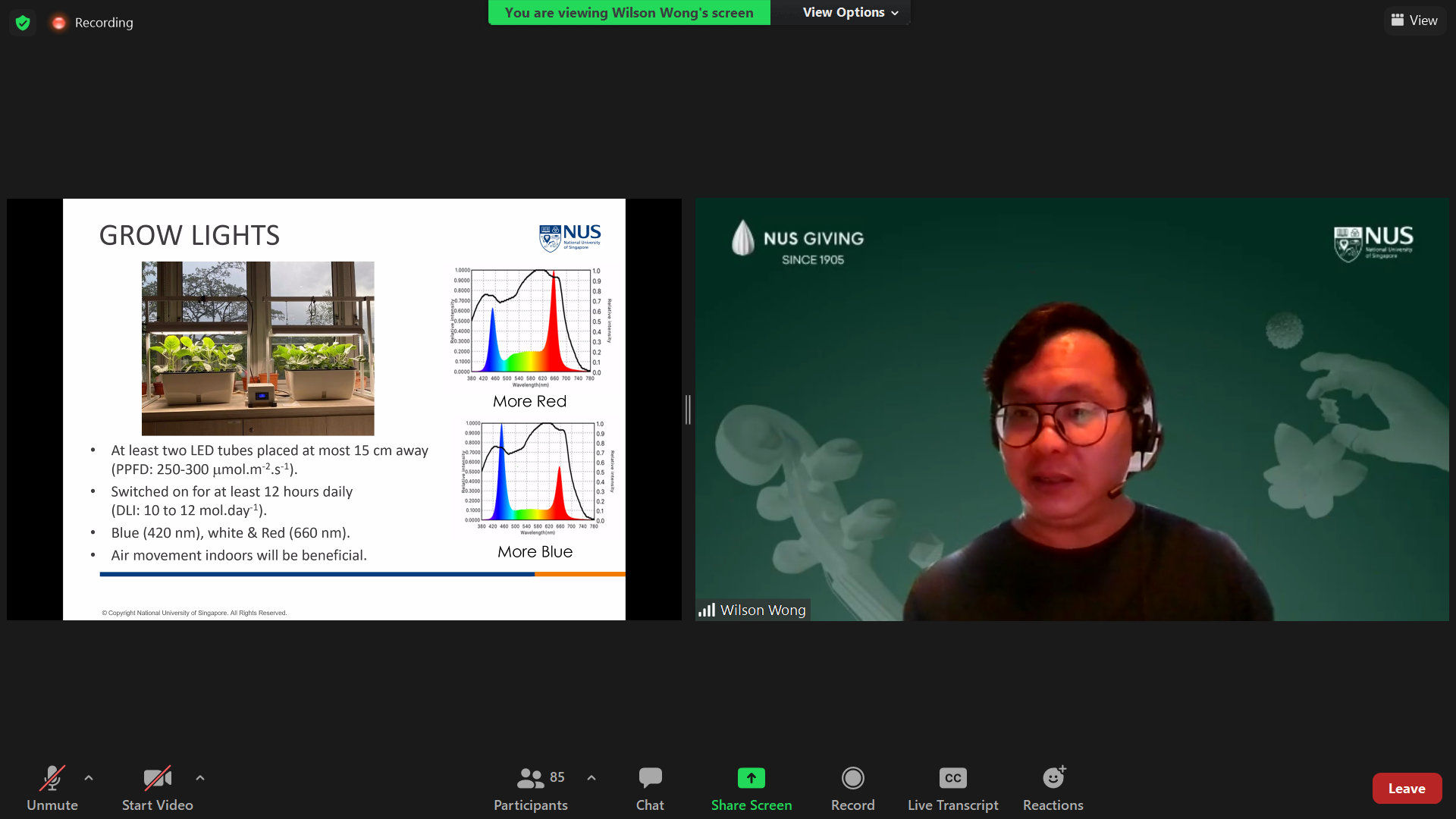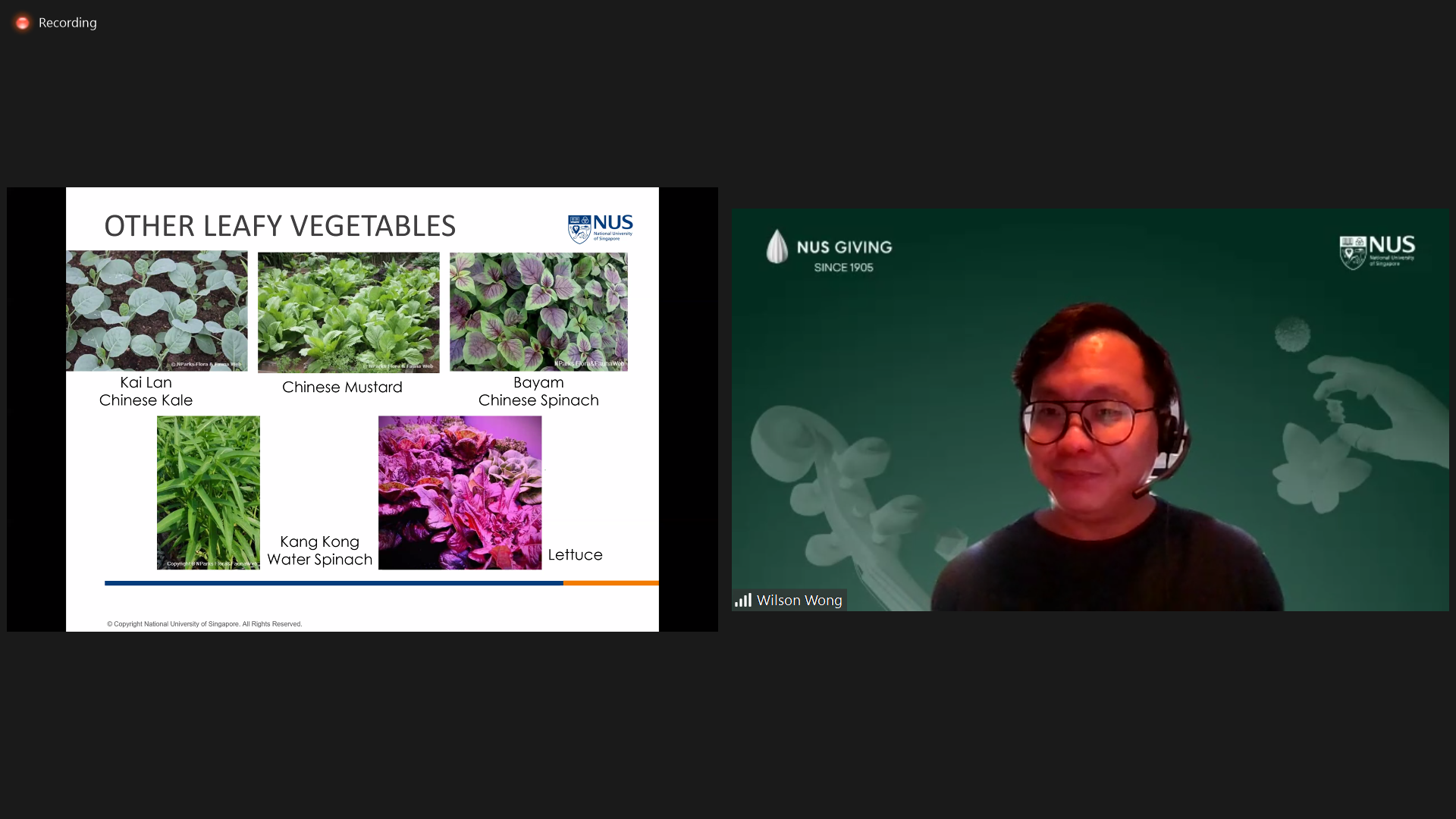Leading horticulturist Dr Wilson Wong shared how to grow your own food at a virtual talk at the the Kent Ridge Alumni Family Day 2021.

Living in an apartment without a balcony often means not having plenty of sunlight for your agriculture endeavours. But, not to fret, Dr Wilson Wong shares how grow lights can be a feasible solution.
Want to enjoy an authentic farm-to-table experience in the comfort of your home?
With some handy tips from gardening expert, Dr Wilson Wong, you can now grow snow pea, bok choy and sunflower sprouts for your dinner.
“Microgreens are the easiest, fastest and most rewarding to grow. You don’t need a lot of space or a lot of sunlight. You just need to have a dish. It also doubles up as a table decoration piece. Imagine that you can put it next to your hot pot. You can eat it fresh, directly from pot to pot: from the flowerpot to the cooking pot,” said Dr Wong, Adjunct Assistant Professor from the NUS Faculty of Science’s Food Science Technology department.
The leading horticulturist shared how to grow your own food at a recent virtual talk, titled, “Say Aloe to Home Gardening”. Organised by the NUS Annual Giving team, the session was part of the Kent Ridge Alumni Family Day 2021.
With a deep passion for plants, Dr Wong is the go-to gardening expert in Singapore. Besides his full-time role at the National Parks Board as its Deputy Director (Operations) for Jurong Lake Gardens, he founded a discussion forum for gardening hobbyists, and helms a gardening column for the national newspaper, The Straits Times. The NUS alumnus also teaches urban farming and post-harvest food processing at his alma mater.
To get your edible home garden started, Dr Wong’s advice is to find a good spot with sufficient sunlight. Edible plants need at least six hours of direct sunshine for robust growth.
On how to determine an optimal location, he said, “The kind of sunlight that vegetables need is direct sunlight. How do you know (what direct sunlight is)? You place a sheet of paper underneath your hand. If it casts a dark and sharp shadow, that is what we call direct sunlight.”
However, it can be challenging to find an ideal sunny spot in an apartment. The solution is to use grow lights, shared Dr Wong. He recommended using at least two LED tubes placed 15cm away from the plants. The artificial lights should be switched on for at least 12 hours a day, because the intensity of LED lights is a lot lower than natural sunlight.
Time-strapped working professionals can consider investing in a self-watering pot or an automatic irrigation system, said Dr Wong. He added, “Under the optimal growth conditions, edible plants need to be watered at least once a day. They need enough water, so the soil will be moist. If you don't have time, these gadgets can help you.”
“A growing media that has peat moss in it holds moisture, but sometimes, it can hold too much. So, that's the reason for adding perlite and vermiculite. They will open up the mixture, and give the root zone more air, by enhancing aeration and permitting drainage, so it does not drown your plants,” Dr Wong elaborated.
Just like how humans consume health supplements, plants can also use that extra boost. However, Dr Wong cautioned that the high nutrition concentration in pellet fertilisers is too strong for leafy vegetables. Instead, he proposed using organic powered fertilisers like processed bone meal or chicken manure, which contains nitrogen that is necessary for foliage production.

These homegrown greens need to be just as nutritious. Dr Wong shares how we can care well for these delicious green leafy vegetables.
For pet owners, Dr Wong warned against repurposing pet’s waste pet poo as fertiliser. “Please don't use your rabbit poo, because it contain harmful microbes, and lead to potential food safety issues. If you don't wash and cook your harvests properly, it's going to be a problem,” he said.
In the unfortunate event where pests invade your plants, don’t fret. Dr Wong has a handy homemade cure to get rid of commonly encountered small sap-sucking pests: use a solution made of dilute castile soap.
Cultivating an edible food garden is more than just a therapeutic hobby. A nation of home gardeners would help strengthen our country’s food security.
“Singapore has to get ready for crises, so that we can at least tide ourselves over a short period of time with our homegrown food. This is crucial, because we all know that a large percentage of the food that we eat every day is imported. That leaves us quite vulnerable to geopolitical issues, natural crises, and of course, pandemics,” Dr Wong concluded.






